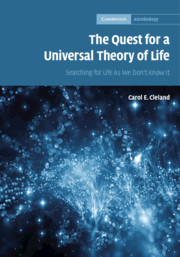Book contents
- The Quest for a Universal Theory of Life
- Reviews
- Cambridge Astrobiology
- The Quest for a Universal Theory of Life
- Copyright page
- Dedication
- Contents
- Acknowledgments
- Introduction
- 1 The Enduring Legacy of Aristotle: The Battle over Life as Self-Organization or (Genetic-Based) Reproduction
- 2 Why Life Cannot Be Defined
- 3 What Is a Scientific Theory?
- 4 How Scientific Theories Develop
- 5 Challenges for a Universal Theory of Life
- 6 Rethinking the Traditional Paradigm for Life: Lessons from the World of Microbes
- 7 Artificial Life: Could ALife Solve the N = 1N=1 Problem?
- 8 Searching for Extraterrestrial Life Without a Definition or Universal Theory of Life
- 9 A Shadow Biosphere: Alien Microbes on Earth?
- Conclusion
- References
- Index
5 - Challenges for a Universal Theory of Life
Published online by Cambridge University Press: 05 September 2019
- The Quest for a Universal Theory of Life
- Reviews
- Cambridge Astrobiology
- The Quest for a Universal Theory of Life
- Copyright page
- Dedication
- Contents
- Acknowledgments
- Introduction
- 1 The Enduring Legacy of Aristotle: The Battle over Life as Self-Organization or (Genetic-Based) Reproduction
- 2 Why Life Cannot Be Defined
- 3 What Is a Scientific Theory?
- 4 How Scientific Theories Develop
- 5 Challenges for a Universal Theory of Life
- 6 Rethinking the Traditional Paradigm for Life: Lessons from the World of Microbes
- 7 Artificial Life: Could ALife Solve the N = 1N=1 Problem?
- 8 Searching for Extraterrestrial Life Without a Definition or Universal Theory of Life
- 9 A Shadow Biosphere: Alien Microbes on Earth?
- Conclusion
- References
- Index
Summary
The most significant challenge facing the pursuit of a universal theory of life is the infamous “N = 1 problem.” In the late twentieth century biologists made an astonishing discovery. Life as we know it on Earth today descends from a last universal common ancestor (LUCA), and hence represents a single example of life. Logically speaking, one cannot safely generalize to all of life, wherever and whenever it may be found, on the basis of a single example. As Section 5.2 explains, the N = 1 problem of biology is not just a pernickety logical point. There are compelling scientific reasons for worrying that our sample of one may be unrepresentative of life. Biochemists and molecular biologists have established that life could differ from familiar Earth life in significant ways at the molecular and biochemical levels. In addition, astrobiologists have explored how the basic functions of familiar life (metabolism and genetic-based reproduction) might be realized by molecular compounds based on elements other than carbon under chemical and physical conditions differing from those thought to have been present on early Earth.
- Type
- Chapter
- Information
- The Quest for a Universal Theory of LifeSearching for Life As We Don't Know It, pp. 105 - 131Publisher: Cambridge University PressPrint publication year: 2019

